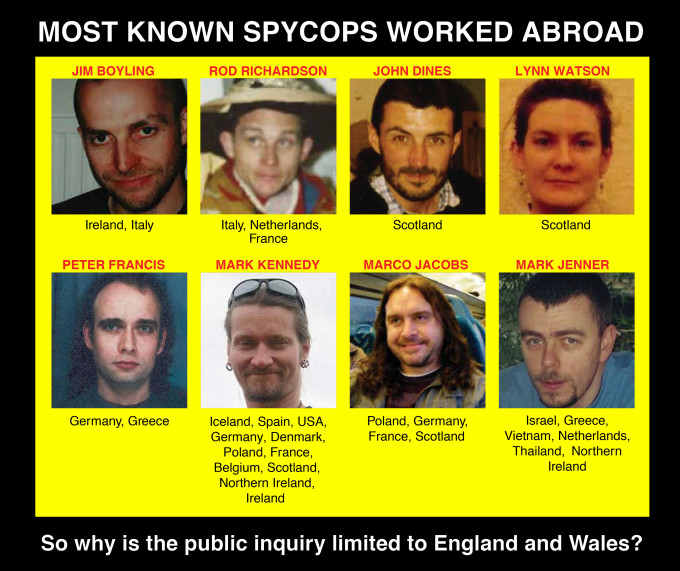The Pitchford Inquiry’s Geographical Blinkers
The public inquiry into undercover policing is in a stage of active preparation, with the hearings expected to start properly next summer.
We’ve already had the inquiry’s Terms of Reference set out by the Home Secretary. It will
inquire into and report on undercover police operations conducted by English and Welsh police forces in England and Wales since 1968.
This
will include, but not be limited to, the undercover operations of the Special Demonstration Squad and the National Public Order Intelligence Unit.
More than half the exposed officers from those units worked outside England and Wales. They spied in at least seventeen different countries over a period of 25 years (the Undercover Research Group has produced a detailed list of dozens of instances). If this is the case with the known officers, it’s safe to presume many of their colleagues did it too.
Some officers are known to have committed crimes whilst working undercover abroad. It’s more than two years since German MP Andrej Hunko told the UK parliament.
Mark Kennedy was accused and found guilty of an arson attack in Berlin. But he was giving evidence in court under his false name to escape legal proceeding under his real name.
This is exactly the sort of thing that is the subject of the inquiry – if it’s in England and Wales. If the British police are farming these activities out on a large scale to dozens of countries it surely warrants proper investigation.
Conversely, Hunko has discovered that German police sent numerous undercover officers to the anti-G8 protests in Scotland in 2005. It is hardly likely to have been a one-off.
If an officer’s actions are an outrage in England and Wales, the same deed is equally an outrage if committed elsewhere. Who is responsible if an English undercover officer commits crimes whilst working abroad? What protects the public from foreign spies here? What deals are done between governments? If these officers aren’t reined in when working in the UK, are they even more cavalier toward citizens, laws and rights when away from their overseers?
As it stands, the Pitchford Inquiry appears uninterested in the answers. Its stated aim is to explore “the motivation for and scope of, undercover policing operations in practice and their effect upon individuals in particular and the public in general”. The geographical blinkers are a barrier to this. If it refuses to look at a significant element of the work of many officers, the inquiry cannot get a thorough overview and so undermines its very purpose.
This restriction in the Terms of Reference was handed to Pitchford and his team by the Home Secretary. It’s time for the inquiry, and others, to insist that she drops this clause.
If it is to be credible, the Pitchford Inquiry must give equal weight to equivalent actions and experiences of undercover officers and their victims, wherever they happened to be. The limit of England and Wales has to go.
= = = = = = = = = = =
British undercover officers and the countries they worked in
Mark Kennedy
A 2012 report by Her Majesty’s Inspectorate of Constabulary refers to Kennedy professionally visiting 11 countries on more than 40 occasions, including 14 visits to Scotland. As with so much else, officialdom has not been forthcoming and the real work has been done by spied-on activists and allied journalists. It appears these countries included:
1. Scotland
2. Northern Ireland
3. Ireland
4. Iceland
5. Spain
6. Germany
7. Denmark
8. Poland
9. USA
10. France
11. Belgium
Mark Jenner
1. Israel
2. Greece
3. Netherlands
4. Thailand
5. Vietnam
6.Ireland
7. Northern Ireland
8. Scotland
In Northern Ireland, Jenner took campaigners on a trip to republican West Belfast and Derry which included meeting Sinn Fein councillors. He also took part in fighting when nationalists clashed with a loyalist Apprentice Boys of Derry march.
Marco Jacobs
1. Poland
2. Germany
3. France
4. Scotland
Rod Richardson
1. Italy
2. Netherlands
3. France
Peter Francis
1. Germany
2. Greece
Jim Boyling
1. Ireland
2. Italy
John Dines
1. Scotland
2. Ireland
Lynn Watson
1. Scotland
Jason Bishop
1. Scotland


4 comments on “The Pitchford Inquiry’s Geographical Blinkers”